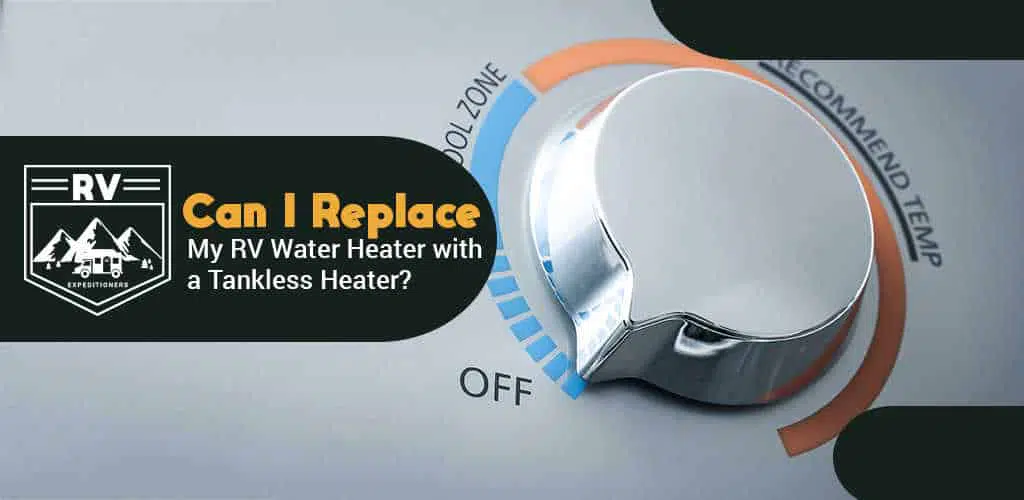A tankless heating system is very attractive to most motorhome owners. Instead of keeping hot water in a tank, a tankless system heats up the water as needed.
It has the potential to help you save money on heating costs and it can also guarantee more hot water uptime than a standard water heater tank assembly.
Suggested read: What are the Best RV Tankless Water Heaters?
But what if you already have a water heater installed in your RV? If you’re asking yourself can I replace my RV water heater with a tankless system, the answer is yes, and, this article will guide you through the process.
Because they work entirely different from one another, a regular RV water heater can’t be converted to a tankless system. It can however be replaced for one.
This can be done as a DIY project, but it’s not advisable if you don’t have all the tools and the technical know-how.
What You Need to Know
Here are a couple of things about tankless heating systems that you have to know before making your standard water heater tankless.
Water Usage
Choosing a tankless system involves first calculating your water usage. This means taking into account the toilet, shower, sink, dishwasher, etc. Think about how often you’ll use those amenities and appliances to figure out how powerful the tankless heater should be.
You may find heaters that can work up to 6 gallons per minute, which is a lot for any RV. But even then, the water temperature may not be constant.
This is why regardless of how powerful the tankless heater system is, it’s recommended that you only use one appliance or outlet at a time for constant hot water temperature.
Electric or Gas
Propane or natural gas-powered tankless water heaters are usually the best choices for mobile homes. Electric tankless heaters are less efficient and may not be practical for an RV. These things draw a ton of power.
Placement
You can install a tankless water heater on the inside or on the outside of your RV. But, if you choose to put it on the outside, remember that you will also need an anti-freeze kit for winter time. Also, in some states, there may be regulations in regard to ventilation.
Costs
When you’re talking about replacing a standard water heater with a tankless system, you need to start adding up certain costs. Tankless systems may be more efficient and long-lasting, but they have a high initial cost. On top of that, you have to add fuel costs and the installation cost.
The installation alone can cost you hundreds of dollars on top of the tankless system itself. That’s because there are many modifications to be made (electrical panel, gas lines, plumbing) and you’ll likely also need a separate ventilation system.
Last but not least, tankless heaters require more maintenance year-round, but you can cut that down if you install an interior tankless water heater system.
Pros and Cons of Converting to a Tankless Heating System
On-demand heating is the main benefit of getting rid of your standard RV heating system in favor of a tankless solution. It’s especially beneficial when you have a limited water supply.
Longevity is also a nice perk. Most tankless heating systems can last up to 20 years. That’s nearly double the shelf life of most RV tank-based water heaters.
Last but not least, having access to a continuous supply of hot water, whenever possible, takes motorhome living to another level.
But, it’s not all perfect. Replacing your standard water heater is expensive since tankless systems can be up to 80% more expensive than a tank water heater.
This takes into account the additional installation costs.
In regards to installation, there are many things to worry about. You need knowledge of how to work with gas lines and plumbing, not to mention that in some states a dedicated venting system may be required by law.
You have to accept that you may not be able to install a tankless system without professional help. But, you might be able to save some of the installation cost by removing your existing water heater first.
Final Thoughts
Not all RV owners will benefit equally from a tankless water heater. If you just use your RV for recreational purposes, then you may not have a permanent hookup to gas lines. This means that an electrical tankless water heater assembly is required.
For those who only spend weekends or holidays in the motorhome, investing in a power-hungry electric tankless water heater may not be worth it if you don’t already have a high-end power bank.
On the other hand, if you’ve adopted the RV lifestyle, and you’ve made your RV your permanent residence, then a tankless system becomes worth considering. If you have access to a gas hookup and an unlimited water supply, a tankless system can increase the level of comfort tenfold.

